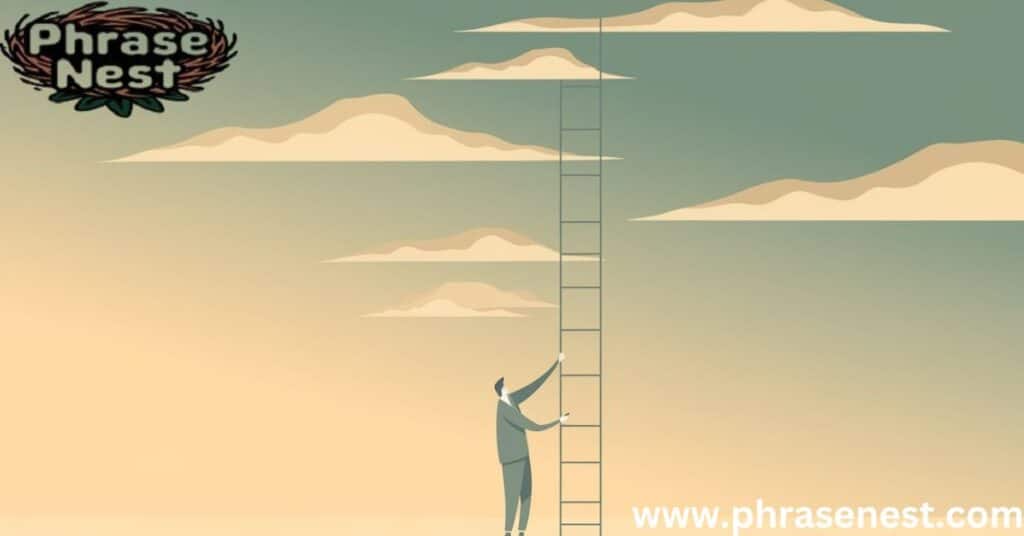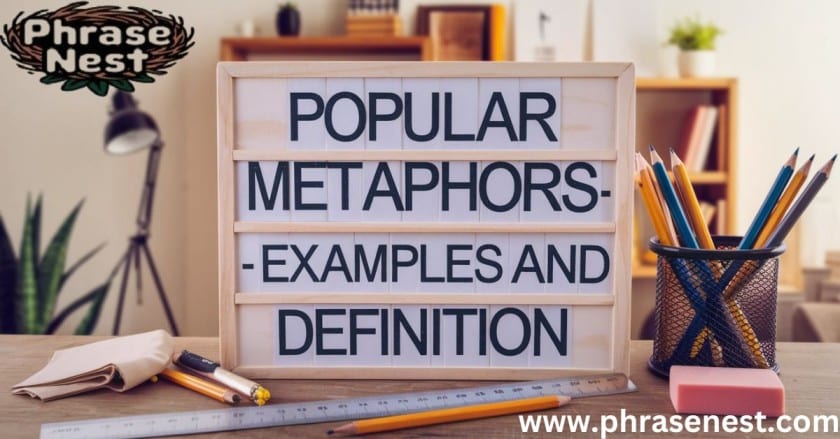Popular metaphors are everywhere in our daily conversations, enriching the way we express ourselves. They turn abstract ideas into relatable concepts, making our language come alive. Have you ever used a metaphor without even realizing it?
In this article, you’ll discover some of the most engaging and familiar metaphors that can elevate your communication skills. Whether you want to impress others or simply enhance your understanding, these vivid expressions will change the way you think about language. Let’s dive in and explore how these powerful phrases can add depth to your conversations!
1. Time is a Thief
- Meaning: This metaphor suggests that time steals moments from our lives, emphasizing how quickly time passes and how we often feel we don’t have enough of it.
- In a Sentence: “As I look back on my childhood, I realize time is a thief that took away those carefree days.”
- Other Ways to Say: Time flies, Time slips away, Time marches on.
2. Life is a Journey
- Meaning: This metaphor views life as a path with various experiences, challenges, and destinations, highlighting the idea of growth and change over time.
- In a Sentence: “After years of hard work and self-discovery, I feel like I’m finally on the right path in my life’s journey.”
- Other Ways to Say: Life is an adventure, Life is a road trip, Life is a quest.
3. The World is a Stage
- Meaning: This metaphor suggests that life is like a performance where we play different roles, underlining themes of pretense and the roles we adopt in society.
- In a Sentence: “In the world of corporate politics, it often feels like the world is a stage where everyone plays their part.”
- Other Ways to Say: Life is a play, Society is a theater, We all wear masks.
4. Love is a Battlefield
- Meaning: This metaphor illustrates love as a struggle or conflict, emphasizing the challenges and emotional turmoil that can accompany relationships.
- In a Sentence: “Their relationship seemed perfect, but love is a battlefield, and they faced more than a few skirmishes.”
- Other Ways to Say: Love is a struggle, Romance is a war, Relationships are tough.
5. Ideas are Seeds
- Meaning: This metaphor indicates that ideas, like seeds, have the potential to grow and flourish when nurtured, symbolizing creativity and innovation.
- In a Sentence: “When brainstorming, I like to think of my ideas as seeds that need the right environment to blossom.”
- Other Ways to Say: Ideas are beginnings, Thoughts are plants, Concepts can grow.
6. The Mind is a Garden
- Meaning: This metaphor compares the mind to a garden, suggesting that thoughts can be cultivated like plants, with positive ideas flourishing while negative ones can be weeds.
- In a Sentence: “I strive to keep my mind a garden, tending to positive thoughts while pulling out negativity.”
- Other Ways to Say: The mind is a landscape, Thoughts are flowers, Ideas are crops.
7. Knowledge is Power

- Meaning: This metaphor conveys that having knowledge equips individuals with the ability to influence and succeed, highlighting the importance of education and learning.
- In a Sentence: “She believes that knowledge is power, so she spends her evenings reading and expanding her horizons.”
- Other Ways to Say: Knowledge is strength, Information is influence, Learning is empowerment.
8. The Iceberg Theory
- Meaning: This metaphor suggests that only a small part of a situation is visible, while the bulk of it remains hidden beneath the surface, often used to describe complex issues or emotions.
- In a Sentence: “When discussing his feelings, I realized he was only sharing the tip of the iceberg; so much more lay hidden beneath.”
- Other Ways to Say: There’s more than meets the eye, A small part of a bigger picture, The surface hides the depth.
9. The Ball is in Your Court
- Meaning: This metaphor indicates that it’s someone’s turn to take action or make a decision, emphasizing personal responsibility in a situation.
- In a Sentence: “I’ve given you all the information you need; now the ball is in your court.”
- Other Ways to Say: It’s your move, The next step is yours, The decision is up to you.
10. A Double-Edged Sword
- Meaning: This metaphor describes something that has both positive and negative consequences, highlighting the complexity of certain situations or choices.
- In a Sentence: “While social media can connect us, it can also be a double-edged sword that leads to misunderstandings.”
- Other Ways to Say: A mixed blessing, A blessing and a curse, A two-sided coin.
11. A Storm is Brewing
- Meaning: This metaphor indicates that trouble or conflict is on the horizon, often used to foreshadow impending difficulties.
- In a Sentence: “There’s tension in the office; I can feel that a storm is brewing.”
- Other Ways to Say: Trouble is coming, Conflict is looming, A crisis is approaching.
12. The Fabric of Society
- Meaning: This metaphor compares society to a woven fabric, suggesting that various elements and relationships are interconnected and essential for its integrity.
- In a Sentence: “Education is a key thread in the fabric of society, holding communities together.”
- Other Ways to Say: The backbone of society, The structure of our community, The network of relationships.
13. A Roller Coaster of Emotions
- Meaning: This metaphor depicts emotions as a ride that has ups and downs, highlighting the unpredictable nature of feelings and experiences.
- In a Sentence: “After the news, I experienced a roller coaster of emotions, swinging from joy to despair in moments.”
- Other Ways to Say: An emotional whirlwind, A tumultuous journey, A bumpy ride of feelings.
14. A Light at the End of the Tunnel
- Meaning: This metaphor signifies hope or a positive outcome after a period of difficulty, suggesting that challenges can eventually lead to better times.
- In a Sentence: “After months of job searching, I finally see a light at the end of the tunnel with this new opportunity.”
- Other Ways to Say: Hope on the horizon, A glimpse of relief, The promise of better days.
15. A Wolf in Sheep’s Clothing
- Other Ways to Say: A masquerade of innocence, A deceptive facade, Hidden agendas.
- Meaning: This metaphor refers to someone who appears harmless but actually has malicious intentions, emphasizing deception and trickery.
- In a Sentence: “Be careful of that new employee; he might be a wolf in sheep’s clothing, trying to undermine the team.”
conclusion
Metaphors are powerful tools in language. They help us express complex ideas in simple ways. By comparing one thing to another, we create vivid images that resonate with our experiences.
Using metaphors can enhance our communication and make our speech more engaging. They allow us to convey feelings and thoughts that might be hard to express otherwise. Understanding and using metaphors can deepen our connections with others and enrich our conversations. They truly add color to our language!

Quiz: Popular Metaphors
1. What does the metaphor “Time is a Thief” suggest?
A) Time is valuable
B) Time steals moments from our lives
C) Time is slow
D) Time is an illusion
Answer: B) Time steals moments from our lives
2. In the metaphor “Life is a Journey,” what does it emphasize?
A) The final destination
B) The path of experiences and growth
C) The importance of speed
D) The simplicity of life
Answer: B) The path of experiences and growth
3. What does “The World is a Stage” imply about life?
A) Life is a performance with various roles
B) Life is always serious
C) Life is a competition
D) Life has no meaning
Answer: A) Life is a performance with various roles
4. How does the metaphor “Love is a Battlefield” characterize relationships?
A) They are easy and straightforward
B) They can involve struggles and conflicts
C) They are peaceful
D) They always end well
Answer: B) They can involve struggles and conflicts
5. What does the metaphor “Ideas are Seeds” signify?
A) Ideas are useless
B) Ideas have potential to grow
C) Ideas should be discarded
D) Ideas are always small
Answer: B) Ideas have potential to grow
6. In the metaphor “The Mind is a Garden,” what does it suggest about thoughts?
A) They are uncontrollable
B) They should be cultivated and nurtured
C) They are always negative
D) They grow naturally without effort
Answer: B) They should be cultivated and nurtured
7. What does “Knowledge is Power” convey?
A) Knowledge is irrelevant
B) Education and learning empower individuals
C) Power is more important than knowledge
D) Knowledge is limited
Answer: B) Education and learning empower individuals
8. What does the metaphor “The Iceberg Theory” suggest?
A) Only a small part of a situation is visible
B) All situations are straightforward
C) Icebergs are dangerous
D) Everything is transparent
Answer: A) Only a small part of a situation is visible
9. What is implied by “The Ball is in Your Court”?
A) Someone else must act
B) It’s your turn to take action
C) The game is over
D) There’s no choice involved
Answer: B) It’s your turn to take action
10. What does “A Light at the End of the Tunnel” represent?
A) Despair
B) Hope after difficulties
C) Confusion
D) A dead end
Answer: B) Hope after difficulties

Annie Bellish, an author at Phrasenest.com, brings clarity and precision to her articles on grammar and language. Known for her insightful, articulate, and concise writing, she simplifies intricate grammar rules and shares practical tips. Annie’s passion for language shines through her engaging content, helping readers express themselves with confidence and eloquence.

